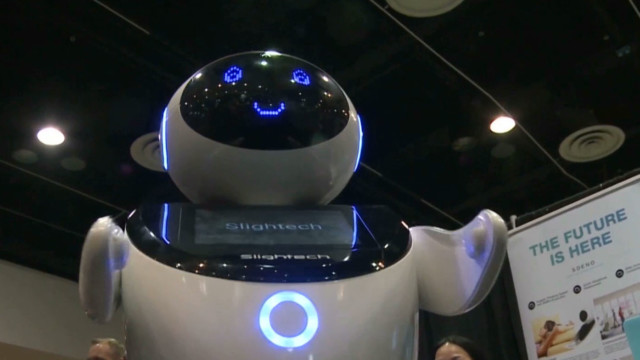Technologists believe Artificial Intelligence has the potential to radically transform everything from healthcare to education to transportation. But not everyone is convinced it’s a panacea. CGTN’s Mark Niu reports.
U.K. Prime Minister Theresa May says she wants the U.K. to be the leader in deciding how AI can be deployed in a safe and ethical manner. Physicist Stephen Hawking and Tesla CEO Elon Musk have both warned about the possibility of AI destroying civilization.
Startups working with artificial intelligence are a frequent sight at tech conferences in Silicon Valley.
Sensorscall uses AI to help these devices learn an elderly person’s behavior to make sure they’re safe. But the founder admits when it comes to mixing AI with robots, his anxiety grows.
“The robots can definitely overtake us,” said Fereydoun Taslimi, founder and chief executive of Sensorscall. “Because the minute it comes to movement — hurting human beings — it’s a little different.”
Musk has called AI a greater risk than the DPRK and expressed fears that Google could accidentally produce AI robots capable of destroying mankind. He’s invested $10 million in the Future of Life Institute, which funds research projects that channel AI toward a safe and beneficial direction.
“We control what happens on earth. If we create something that’s much smarter than us, more effective than us, more capable at achieving its goals than us, then what is our place in that world?” asks Anthony Aguirre, co-founder of the Future of Life Institute.
A lack of consensus on when AI will match human intelligence is one reason why Aguirre, a physicist, has created the website Metaculus.
It allows engineers, scientists and anyone to make predictions on technology and the future, such as whether a machine will pass the Turing test by 2026 and develop intelligent behavior indistinguishable from that of a human.
Metaculus even has a leaderboard that track which users continuously make the best predictions, so you know whom to trust.
If you keep browsing Metaculus, you’ll find some fascinating questions like, “When will AI’s program programs that can program AI’s?” At the time of our publicaion, the median guess was the year 2041.
“If you imagine an artificial intelligence that designs a new version of itself that’s a little better, you know maybe it takes a month to do that but then the next version it’s better at designing AI, so it can do the next one in maybe a week. Next one happens in maybe a day or an hour,” said Aguirre. “And so you have a system that is getting much smarter and smarter and smarter on a time scale much quicker than humans can control it.”
The company Voicera has built a business AI assistant called Eva that takes notes and identifies action items for follow up. Founder Omar Tawakol, says the more imminent threat in AI is its potential to wreak economic and social havoc by changing the fabric of the workplace.
“The real problem is that the owners of robots are going to get more wealth. That I can create a robot company here and take jobs in many, many places around the world, it’s us, the human decisions we make that are the real threat,” he said.
 CGTN America
CGTN America
